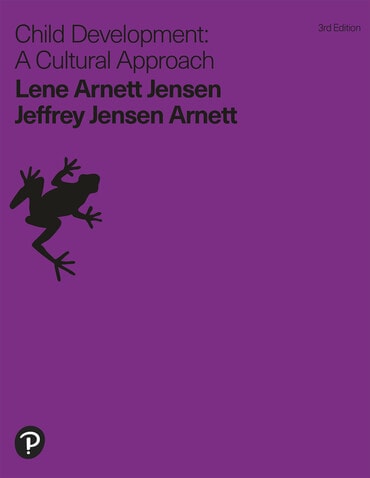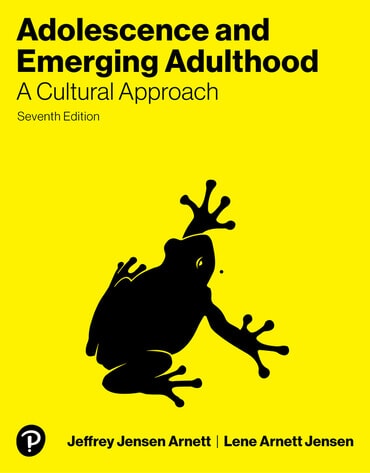Arnett & Jensen Developmental Titles
Jeffrey Jensen Arnett, Clark University
Lene Arnett Jensen, Clark University
A Cultural Approach to Development
Jeffrey Jensen Arnett and Lene Arnett Jensen’s human development, child development, and adolescent development titles examine the process of development through the lens of the amazing range of human cultural diversity.
The author team explores the various cultural pathways of development that humans have forged in response to their local conditions and the creative inspiration of their imaginations. By adopting a cultural approach, the authors challenge students to think culturally so that when they apply developmental research to the work they do or to their own lives, they understand that there is—always and everywhere—a cultural basis to development.
Explore the series | Features | Meet the authors | Testimonials | Author webinars





movie01
movie01
movie01
movie04

Features
Jeffrey Jensen Arnett and Lene Arnett Jensen weave features throughout their texts that help students understand how culture impacts development and why it matters. Explore some of these key features below. Connect with your Pearson Representative today to learn more about the features of the specific product you are interested in.
modal-feature

modal-feature

modal-feature

modal-feature

modal-feature

modal-feature

A conversation with ...
MyVirtualChild | MyVirtualLife
Included at no additional cost to students inside all Revel developmental courses.

MyVirtualChild and MyVirtualLife prompt students to apply developmental principles as they raise a virtual child or live a virtual life. These authentic simulations show how developmental concepts play out over the course of a person’s lifetime, from childhood through adolescence and adulthood.
Realistic scenarios with a range of responses to choose from form the backbone of the MyVirtuals products. Just like in the real world, students’ parenting decisions and life choices combine with environmental and genetic factors — determined by quizzes students take at the start of the program as well as assigned at random — to shape the development of the virtual character. And because it is driven by a unique set of choices made by the student, each MyVirtuals learning experience is customized to be personally relevant and deeply resonant.


Kelly Mollica
Jeffrey Jensen Arnett
Jeffrey Jensen Arnett is a senior research scholar in the Department of Psychology at Clark University in Worcester, Massachusetts. He received his PhD in developmental psychology in 1986 from the University of Virginia and did three years of postdoctoral work at the University of Chicago. From 1992 through 1998, he was an associate professor in the Department of Human Development and Family Studies at the University of Missouri. In the fall of 2005, he was a Fulbright Scholar at the University of Copenhagen in Denmark; from 2010 to 2011, he was the Nehru Chair at Maharaja Sayajirao University in India; and from 2017 to 2018, he was a visiting professor at the University of Bordeaux in France.
His primary scholarly interest for the past 20 years has been in emerging adulthood. He coined the term, and he has conducted research on emerging adults concerning a wide variety of topics and involving several different ethnic groups in American society. He is the founding president and executive director of the Society for the Study of Emerging Adulthood (SSEA). From 2005 to 2014, he was the editor of the Journal of Adolescent Research (JAR), and he is currently on the editorial board of JAR and five other journals. He has published many theoretical and research papers on emerging adulthood in peer-reviewed journals, as well as the book Emerging Adulthood: The Winding Road from the Late Teens Through the Twenties (2024, 3rd edition, Oxford University Press), among many others. For more information, visit his website.

Nicole M. Coomer
Lene Arnett Jensen
Lene Arnett Jensen is a senior research scientist in the Department of Psychology at Clark University in Worcester, Massachusetts. She received her PhD in developmental psychology in 1994 from the University of Chicago and did a one-year postdoctoral fellowship at the University of California, Berkeley. Prior to coming to Clark University, she taught at the University of Missouri and Catholic University of America. She has also been a visiting professor at Stanford University, Shenzhen University in China, Aalborg University in Denmark, Maharaja Sayajirao University in India and the University of Bordeaux in France. She has taught courses on developmental psychology for more than 30 years.
As the originator of the “cultural-developmental approach” to theory and research, she aims to move the discipline of psychology toward understanding development both in terms of what is universal and what is cultural. Her publications include Immigrant Civic Engagement: New Translations (2008, Taylor-Francis), Bridging Cultural and Developmental Psychology: New Syntheses for Theory, Research and Policy (2011, Oxford University Press), the Oxford Handbook of Human Development and Culture (2015, Oxford University Press), Moral Development in a Global World: Research from a Cultural-Developmental Perspective (2015, Cambridge University Press), and the Oxford Handbook of Moral Development (2020, Oxford University Press). From 2004 to 2015, she was editor-in-chief for the journal New Directions for Child and Adolescent Development (with Reed Larson). She served as program chair for the 2012 biennial conference of the Society for Research on Adolescence (with Xinyin Chen) and currently serves on the boards of several journals. For more information, visit her website.

"[The text is] credible and digestible for students. The stories included in each chapter have been very helpful for students to apply the concepts. I use application questions in our quizzes to test their knowledge, and the stories are a great tool."
—Meghan Yerhot, M.S. on Adolescence & Emerging Adulthood
“I felt [the text] does the best job providing current and cross cultural research in a way that is easy to digest. It also offers a lot of additional resources for students through the Revel platform.”
—Psychology Instructor, currently using Adolescence & Emerging Adulthood, Colorado State University
Want to learn more?
Contact us to request a desk copy, an eText, to schedule a demo of Revel, or for any other questions. We look forward to connecting with you!




